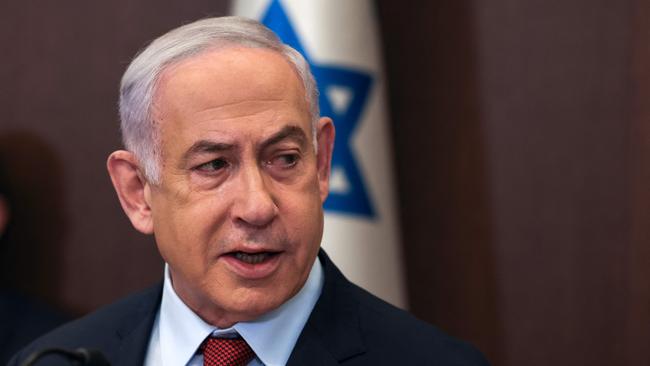Israeli to fight unilateral recognition of a Palestinian state
Benjamin Netanyahu has vowed to vigorously oppose plans by some allies to recognise a Palestinian state without Israeli participation in talks.

The government of Israeli Prime Minister Benjamin Netanyahu has vowed to vigorously oppose plans by some allies to recognise a Palestinian state without Israeli participation in talks, but signalled willingness to engage in direct negotiations with Palestinians, something that hasn’t taken place in more than a decade.
The decision was announced after the UK and France said they were considering recognising a Palestinian state before any final settlement between Israelis and Palestinians. Recognising a Palestinian state without Israeli approval would mark a shift from longstanding US and European policy, which has sought a negotiated solution between the two sides that would result in two internationally recognised states living side by side.
“Israel utterly rejects international diktats regarding a permanent settlement with the Palestinians,” read a resolution voted on by the cabinet. “Such an arrangement will be achieved only by direct negotiations between the parties, without preconditions.”
Israel hasn’t held direct negotiations with Palestinians since 2014. Mr Netanyahu has long said that the Palestinian Authority would need to recognise Israel as a homeland of the Jewish people before engaging in direct talks over a future resolution to the conflict between the two sides.
The vote comes as the US and Europe have been increasing pressure on Mr Netanyahu to agree to a pathway to creating a Palestinian state that could take over post-war Gaza. Mr Netanyahu has argued that creating a Palestinian state after October 7 would reward Hamas for its attack, which killed 1200 people.
US officials, including President Joe Biden, have expressed growing frustration with Mr Netanyahu and some of the more hard-line members of his government over their public pushback against the creation of a Palestinian state and have feared that it could jeopardise efforts towards normalising relations with Saudi Arabia, an issue that is now viewed as inextricably linked to the recognition of a Palestinian state.
American officials have been travelling regularly to Israel in the hope of pressuring Mr Netanyahu and others in his government to accept that the creation of a Palestinian state is vital for the security of Israel and the region.
In response to the October 7 attack, Israel has pledged to eradicate Hamas, which has been designated a terror group by the US, from the Gaza Strip. The resulting offensive has killed nearly 29,000 people in Gaza, most of them women and children, according to health officials in Gaza. The figures don’t distinguish between civilians and combatants.
Pressure from the international community for a two-state solution as part of any resolution of the war has been rising. Gulf states that could be asked to participate in the reconstruction of Gaza say that they won’t pay for rebuilding without the prospect of a Palestinian state.
The US has suggested a resolution of the war could also involve a normalisation of relations between Israel and Arab states such as Saudi Arabia.
In the years leading up to the war, Israel had signed agreements with some Muslim-majority countries to normalise relations.
Over the weekend, US Secretary of State Antony Blinken suggested that Israel could be accepted more widely in the region as part of a peace plan.
“Virtually every Arab country now genuinely wants to integrate Israel into the region, to normalise relations if they haven’t already done so,” he said in response to a question at the annual Munich Security Conference in Germany.
Cinzia Bianco, a researcher focusing on the Gulf region at the European Council on Foreign Relations, said Mr Blinken’s comments could be aimed at enticing Israeli leaders to be more co-operative with the US in finding a solution to the conflict.
Countries such as Tunisia and Oman, in addition to Saudi Arabia, could be encouraged to normalise relations with Israel in exchange for the establishment of an independent Palestinian state, she added.
However, the challenges to such a grand bargain are stiff, she said. “I really fear this is a new indication that the US administration is feeling a bit lost on how to pursue their core objectives vis-a-vis the conflict,” Ms Bianco said.
Mr Netanyahu argues that Israel needs to maintain effective security control over the West Bank and Gaza for the foreseeable future and that any Palestinian state would need to be demilitarised. He has also said Palestinians would need to “deradicalise”.
“Palestinian civil society needs to be transformed so that its people support fighting terrorism rather than funding it,” Mr Netayahu wrote in a recent opinion column to The Wall Street Journal.
If those conditions could be met, he has said he was open to negotiating a political settlement with the Palestinians.
In the past, the Palestinians as well as the US have also demanded that Israel freeze Israeli settlement expansion in the occupied West Bank as a precondition for peace talks.
The Wall Street Journal



To join the conversation, please log in. Don't have an account? Register
Join the conversation, you are commenting as Logout